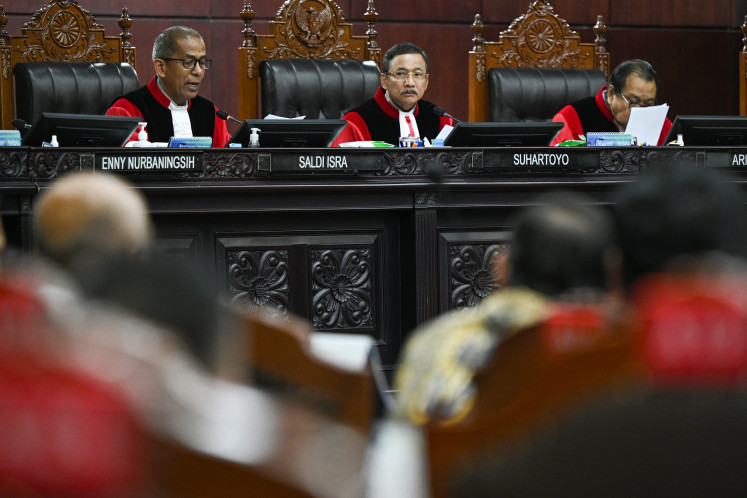Popular Reads
Top Results
Can't find what you're looking for?
View all search resultsPopular Reads
Top Results
Can't find what you're looking for?
View all search resultsRI firms invest heavily abroad
Direct investments made by Indonesian companies abroad almost tripled in value last year, central bank data reveals
Change text size
Gift Premium Articles
to Anyone
D
irect investments made by Indonesian companies abroad almost tripled in value last year, central bank data reveals. Although the latest development is considered positive, many business players argue that it reflects deteriorating investment conditions domestically.
As of the end of December 2011, Indonesian companies had invested a whopping US$7.7 billion in a variety of business sectors in Asia, the Americas and Africa. The investment value grew by 185 percent compared to $2.7 billion in 2010.
“Indonesian companies have begun to see that the domestic market has become saturated and therefore they are looking for new markets by expanding their businesses abroad,” said Sofjan Wanandi, chairman of the Indonesian Employers Association (Apindo).
The investments, he said, were made largely in other Asian countries and in South America. “This is all part of globalization. You cannot stop domestic companies from going global if they want to do so,” Sofjan told The Jakarta Post.
Apindo deputy chairman Hariyadi Sukamdani said that Indonesian businesses had been expanding aggressively in Africa, particularly oil and mining companies. Hariyadi said such companies often found that operating abroad was more cost-efficient.
In comparison to the investments made abroad, domestic businesses spent a total of $8.4 billion on direct investments in the country, or a 25 percent increase from $6.7 billion invested in 2010.
Both Sofjan and Hariyadi said legal uncertainties in Indonesia and the usual impediments in the domestic investment climate also factored into the decision to invest abroad. Indonesian companies are struggling with high production costs, particularly logistics, with a lack of infrastructure development the biggest obstacle.
According to data from the Indonesian Institute of Sciences (LIPI), transportation costs in Indonesia amount to around 30 percent of total production costs due to poor infrastructure, while companies operating in China only need to allocate around 12 percent of their production costs for transporting goods and services.
On top of the infrastructure bottle neck, companies suffer from deals made by politicians in regional governments with workers unions. Recently Apindo was forced to agree to a 23 percent increase in the minimum wage in Tangerang and Bekasi. The deal was made after tens of thousands of workers in Bekasi, West Java, blockaded the Jakarta –Cikarang toll road, protesting against a legal appeal lodged by Apindo for a 16 percent wage increase in the regency. Apindo won the legal battle, but agreed to accept the pay rises due to the labor unrest.
Apindo argues that regional governments abuse their power by disregarding policy recommendations from the National Wage Council (DPN), claiming that many companies will have to relocate due to the new salary standards.
Indonesian Chamber of Commerce and Industry (Kadin) member and lawmaker, Bambang Soesatyo, said that the main reasons for Indonesian businesses aggressively expanding abroad was legal certainty and security issues.
“They want to protect their businesses from domestic threats, such as the lack of security and legal uncertainties. They feel that doing business abroad, such as in China, Cambodia or Vietnam, is more conducive than at home,” he said.










